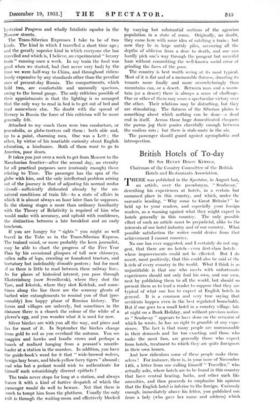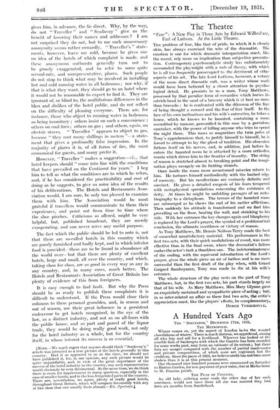British Hotels of To-day
By SIR HENRY DIXON KIMBER, Chairman of the Country Committee of the British Hotels and Restaurants Association. THERE was published in the Spectator, in August last, RR article, over the pseudonym, " Scadavay," describing his experiences at hotels, in a certain but unnamed place in this country, and which, under the sarcastic heading, "Why come to Great Britain?" he held up to your readers, and especially your foreign readers, as a warning against what they might expect in hotels generally in this country. The only possible effect of such an article must be prejudicial, alike to the interests of our hotel industry and of our country. What possible satisfaction the writer could derive from that achievement I cannot conceive.
No one has ever suggested, and I certainly do not sug- gest, that there are no hotels—even first-class hotels-- where improvements could not be effected. But I do assert, most positively, that this could also be said of I he h3tels of every country in the world. What I think is so unjustifiable is that one who meets with unfortunate experiences should not only foul his own, and our own, nest by publishing them to all the world, but should so present them as to lead a reader to suppose that they are typical of what one has to expect at English hotels in general. It is a common and very true saying that accidents happen even in the best regulated households. But if one goes to a small hotel in a country village, bite at night on a Bank Holiday, and without previous notice, as " Scadavay " appears to have done on the occasion of which he wrote, he has no right to grumble at any expe- rience. The fact is that many people are unreasonable in their demands and far too exacting, and those who make the most fuss, arc generally those who expect from hotels, treatment to which they arc quite foreigners in their own homes.
And how ridiculous some of these people make them- selves For instance, there is, in your issue of November 14th, a letter from one calling himself "Traveller," who actually asks, where hotels are to be found in this country that have central heating, baths, and other such like amenities, and then proceeds to emphasize his opinion that the English hotel is inferior to the foreign. Curiously enough, immediately above his letter, you published one from a lady (who gave her name and address) which gives him, in advance, the lie direct. Why, by the way, do not " Traveller " and " Seadavay " give us the benefit of knowing their names and addresses ? I am not surprised they do not, but to me such unnecessary anonymity seems rather cowardly. " Traveller's " state- ments, however, leave me cold, because he gives one no idea of the hotels of which complaint is made, and these anonymous outbursts generally turn out to be grossly exaggerated, and to refer to some quite second-rate, and unrepresentative, places. Such people do not stop to think what may be involved in installing hot and cold running water in all bedrooms ; nor why, if that is what they want, they should go to an hotel where it would not be reasonable to expect to find it. They are ignorant of, or blind to, the multifarious differences in the likes and dislikes of the hotel public, and do not reflect on the difficulty of pleasing everyone. There arc, for instance, those who object to running water in bedrooms as being insanitary ; others insist on such a convenience ; others on coal fires ; others on gas ; and others, again, on electric stoves. " Traveller " appears to object to gas, because "they cost many shillings in meters "—a state- ment that gives a profoundly false impression. In the majority of places it is, of all forms of fire, the most economical for guests, and many prefer it.
However, " Traveller " makes a suggestion—viz., that hotel keepers should "come into line with the conditions that have prevailed on the Continent for years." I beg him to tell us what the conditions are to which he refers, and, if he has considered the practicability and cost of doing as he suggests, to give us some idea of the results of his deliberations. The Hotels and Restaurants Asso- ciation would, I am sure, be only too pleased to examine them with him. The Association would be most grateful if travellers would communicate to them their experiences, and point out from time to time where the shoe pinches. Criticisms so offered, might be very helpful, but, published broadcast, they are merely exasperating, and can never serve any useful purpose.
The fact which the public should be led to note is, not that there are so-called hotels in this country which are poorly furnished and badly kept, and in which inferior food is provided—these are to be found in abundance all the world over—but that there are plenty of excellent hotels, large and small, all over the country, and which, taking class for class, are as good in every way as any in any country, and, in many eases, much better. The Hotels and Restaurants Association of Great Britain has plenty of evidence of this from foreigners.
It is easy enough to find fault. But why the Press should be so ready to publish these complaints it is difficult to understand. If the Press would close their columns to these personal grumbles, and, in season and out of season, use their great influence in a persistent endeavour to get hotels recognized, in the eye of the law, as a distinct industry, and not as on all-fours with the public house, and as part and parcel of the liquor trade, they would be doing really good work, not only for the hotel industry as a whole, but for the country itself, in whose interest its success is so essential.
[Norm—We much regret that anyone should think "Scadavay's" article was intended as a true picture of the hotels generally in this country. Had it so appeared to us at the time, we should not have published it, for, in our opinion, any such picture would be quite unjustifiable, and, in view of the great importance of the success of the hotel industry to the country, any such representation would obviously be very detrimental. At the same time, we do think there is room for improvement in many quarters, especially in the case of smaller hotels, and in the less-frequented parts of the country. There are, nevertheless, we agree, plenty of really good hotels, throughout Great Britain, which will compare favourably with any of like class that one usually finds abroad.—En. Spectator.1



































 Previous page
Previous page